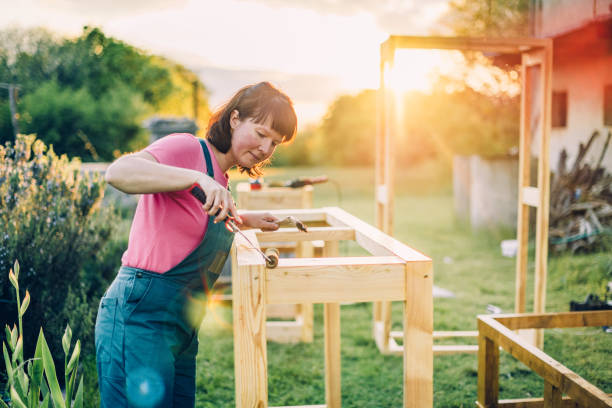
Great Woods for Exterior Projects
When it comes to exterior woodworking projects, choosing the right wood is crucial. At KJP Select Hardwoods, we understand that outdoor projects require materials that can withstand harsh weather conditions, resist pests, and maintain their beauty over time.
Whether you're building a deck, pergola, outdoor furniture, or siding, selecting the best wood ensures durability and longevity. In this post, we’ll explore some of the top woods for exterior projects, helping you make informed decisions for your next build.

Key Considerations for Exterior Woods
Before we dive into specific wood types, let’s discuss the essential factors that make a wood species suitable for outdoor use:
- Durability: The ability to resist decay, rot, and insect infestations is critical.
- Weather Resistance: Woods that can handle moisture, extreme temperatures, and UV exposure are best.
- Maintenance Needs: Some woods require more upkeep than others, which may influence your choice.
- Workability: Ease of cutting, shaping, and fastening can impact construction efficiency.
- Aesthetic Appeal: The natural grain and colour of the wood contribute to the overall look of your project.
Now, let’s take a look at some of the best woods for exterior use.
Ipe (Brazilian Walnut)
Ipe is one of the toughest and most durable hardwoods available for exterior projects. Its extreme density makes it highly resistant to moisture, rot, and insects. Used frequently for decking and boardwalks, Ipe boasts a beautiful deep brown hue that weathers to a silvery-gray patina over time.
Pros:
- Extremely durable and resistant to rot, insects, and weathering
- Low maintenance—requires only periodic cleaning
- Stunning rich brown tones with fine-grain
Cons:
- Very dense and difficult to cut without carbide-tipped blades
- Can be more expensive than other hardwoods
Teak
Teak has been a go-to choice for centuries, particularly in boatbuilding and outdoor furniture. Its natural oils provide excellent water resistance, making it ideal for projects exposed to frequent rain or humidity.
Pros:
- Naturally resistant to moisture, decay, and insects
- Requires minimal maintenance
- Elegant golden-brown colour that ages beautifully
Cons:
- Expensive compared to other woods
- Can be challenging to source sustainably

Western Red Cedar
For a lightweight yet durable softwood option, Western Red Cedar is an excellent choice. It contains natural tannins that protect against rot and insect damage, making it perfect for fences, pergolas, and siding.
Pros:
- Naturally resistant to decay and insects
- Lightweight and easy to work with
- Pleasant Aroma and warm reddish hue
Cons:
- Softer than hardwoods, making it more prone to dents and scratches
- Requires sealing or staining for enhanced longevity
White Oak
White Oak is a domestic hardwood known for its durability and water resistance, thanks to its closed-cell structure. It has been used in boatbuilding for years, proving its ability to withstand wet conditions.
Pros:
- Strong and resilient against moisture
- Beautiful grain with light to medium brown tones
- Readily available and more affordable than exotic hardwoods
Cons:
- Can warp if not properly sealed
- Requires regular maintenance to maintain its appearance

Mahogany (Genuine & African)
Mahogany, both Genuine (Honduran) and African varieties, is a classic choice for elegant outdoor furniture and trim work. It is naturally resistant to decay and has a smooth texture that takes finishes exceptionally well.
Pros:
- Strong yet lightweight, making it easy to work with
- Naturally, rot- and insect-resistant
- Deep reddish-brown colour that develops a rich patina over time
Cons:
- More expensive than domestic softwoods
- Can be difficult to source sustainably
Thermally Modified (Roasted) Ash
A newer option in exterior woodworking, thermally modified ash undergoes a heat treatment process that enhances its durability and resistance to moisture and pests. This eco-friendly alternative provides the performance of exotic hardwoods without environmental concerns.
Pros:
- Highly durable and stable after modification
- Sustainable alternative to tropical hardwoods
- Takes stains and finishes well
Cons:
- Limited availability compared to traditional hardwoods
- Can be brittle if not properly handled
Black Locust
Black Locust is a North American hardwood that offers exceptional durability for exterior applications. It’s often used for fence posts, decking, and outdoor structures due to its natural resistance to rot and pests.
Pros:
- Extremely durable and resistant to decay
- Sustainable and locally sourced
- Requires minimal maintenance
Cons:
- Difficult to work with due to its hardness
- Limited availability in larger sizes
Cypress
Cypress is another great option for exterior applications, especially in humid environments. Its natural oils provide excellent resistance to decay and insects, making it a popular choice for siding and outdoor furniture.
Pros:
- Naturally resistant to moisture and pests
- Easy to work with and takes finishes well
- Affordable compared to some hardwoods
Cons:
- Not as hard as some other options, making it susceptible to dents
- Can require sealing to maintain color
Final Thoughts: Choosing the Right Wood for Your Project
At KJP Select Hardwoods, we believe that the best wood for your exterior project depends on your specific needs. If you’re looking for maximum durability and minimal maintenance, Ipe or Teak may be the best options.

For those seeking a balance of affordability, workability, and aesthetics, Western Red Cedar or White Oak are excellent choices. If sustainability is a priority, thermally modified woods and Black Locust provide fantastic eco-friendly alternatives.
No matter what your project entails, we’re here to help you find the perfect wood. Browse our extensive selection of hardwoods, or reach out to us for expert advice on selecting the best material for your outdoor build. Your next exterior woodworking project starts with quality lumber—and we’ve got you covered!
